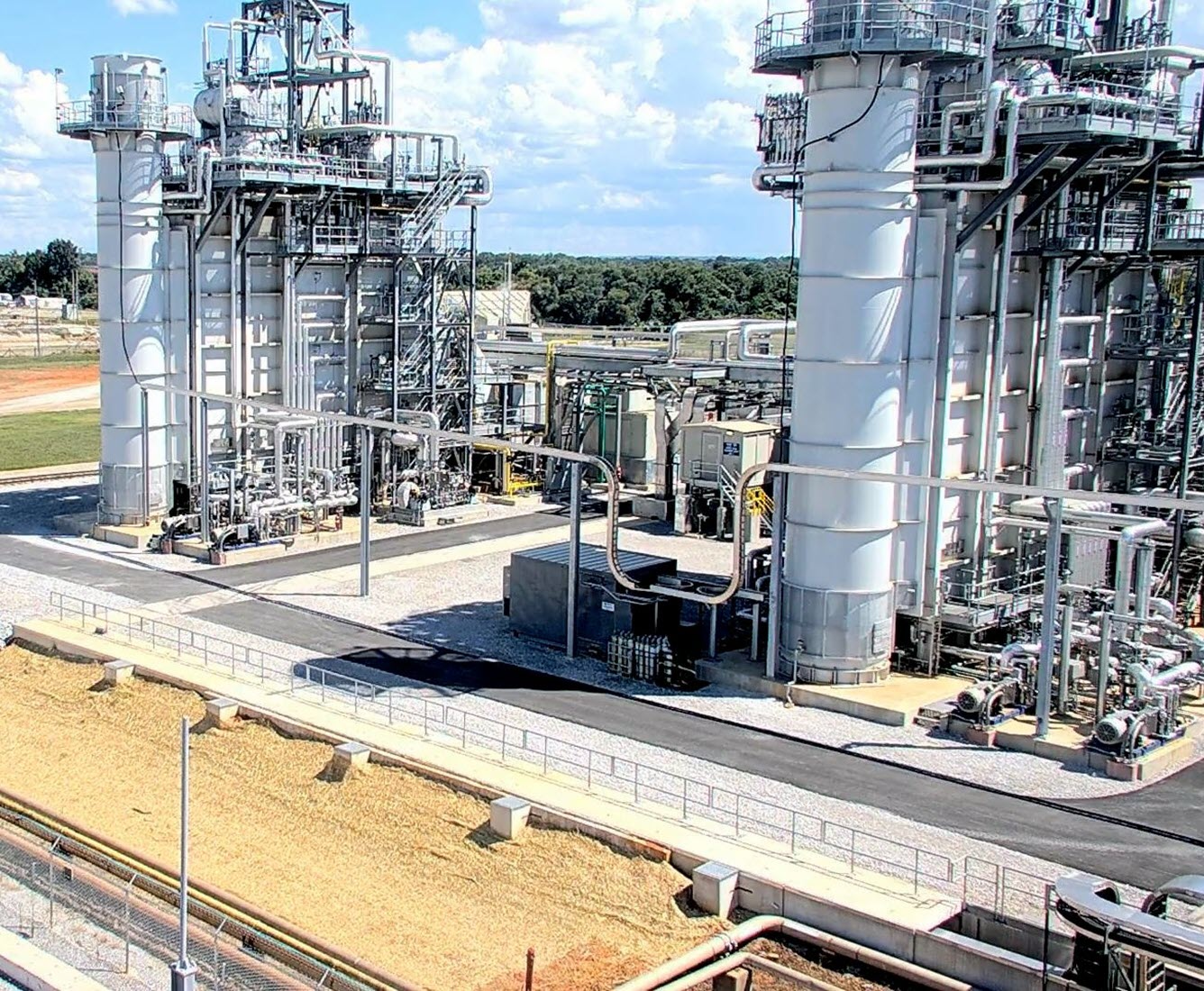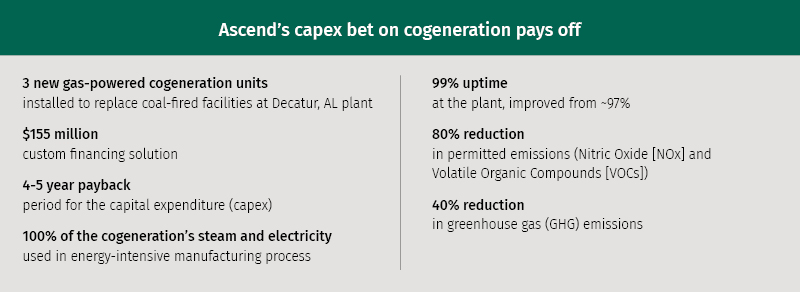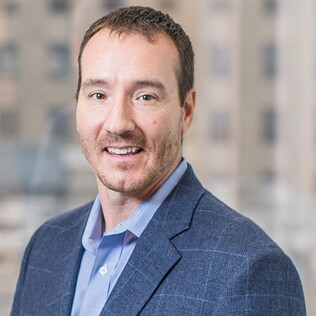
Download a print-friendly version of this article.
When specialty-materials maker Ascend Performance Materials undertook its largest ever facility update in 2021, it was able to cut greenhouse gas (GHG) emissions by 40%. The source of these sustainability gains: three new natural-gas powered cogeneration units to replace legacy coal-burning boilers and reduce dependence on grid electricity at an energy-intensive plant in Decatur, AL. Cogeneration facilities produce both heat and electricity.
Ascend’s team has advice for other companies looking to reduce emissions and advance both business and sustainability goals: start with “essential use” processes that tie most critically to the business. While Ascend values the positive sustainability effects of their upgrade, the project’s success was rooted in the business case for investing in the complex, years-long endeavor. They also brought a problem-solving mindset to their search for financing, which was itself a custom and innovative solution.
Updating critical equipment
Ascend Performance Materials makes specialty materials, including nylon plastics and fibers, that are used in a variety of products from airbags to electronics. The Houston-based company was established when private equity firm SK Capital purchased the core facilities from Solutia, Inc. in 2009.
The manufacturing process for Ascend’s products requires large quantities of both steam and electricity. Its Decatur, AL plant relied on coal-fired steam boilers dating back to the 1950s, as well as electricity from the grid.
Ascend’s operations team knew the company needed a strategy to completely retire its coal-fired equipment. The plant was experiencing increased disruptions in availability of steam or electricity that halted its round-the-clock operations. Additionally, coal-fired boilers also produce substantial emissions including greenhouse gases.
Tackling the financial and operational complexities
Ascend’s operating team aspired to build cogeneration facilities, given that the plant would be able to use 100% of the heat (steam) and energy produced. These facilities are known for their efficiency and reliability. For Ascend’s circumstances, the units also offered a dramatically improved environmental footprint. But it would be a major undertaking to design, build and install the three units that the plant needed. At about $50 million per unit, financing also presented a major hurdle.

The team knew they had to solve for financing first. They explored their extensive banking network for options, and they found the answer with Citizens. Together, Ascend and Citizens devised a customized financing strategy that provided a construction loan to complete the equipment, followed by a six-year finance lease. As the agent, Citizens assembled a group of six banks to complete the deal, including four that were new lenders to Ascend.
The design, building and onboarding of the custom facilities also presented operational complexities. The cogeneration units would require new, specially trained operators. Ascend hired the first operating staff as the facilities were in design so that the lead operators would build deep knowledge of the structures. The company’s knowledge as a manufacturer gave it unique expertise in the process of designing, testing and troubleshooting the customized equipment.
Reaping the benefits of a major capex undertaking
In the years since they were installed, the new units have produced benefits that position Ascend for long term success.
As expected, downtime at the plant decreased, bringing uptime from about 97% to 99%, a valuable boost for a plant that runs more than 8,000 hours per year.
The project drove additional annual savings of as much as $20 million or more in fuel, waste and electricity costs, contributing to a payback period of four to five years.
Then there are the sustainability gains. The new units drove down the Decatur plant’s noxious and pollutive emissions (NOx VOCs) by 80%, as well as lowering GHG emissions by 40%.1 Ascend views these sustainability outcomes as a key component of its strategic positioning. As its customers increasingly measure and manage their own environmental footprints, they are looking for supply-chain relationships that help achieve similar goals. For instance, in the automotive industry, where Ascend is a supplier, many companies have made public sustainability commitments and produce ongoing disclosures. Ascend believes that its sustainability improvements are not only the right thing to do but are also crucial for staying competitive in the decades ahead. The company publishes its own annual sustainability reports, reporting on emissions and specific targets that its customers track closely.
-
The cogen investments were a big project with a lot of people leaning on each other for expertise. It took a broad team to get this done, but we see the benefits of those efforts every day.

Chris Johnson
Ascend’s Senior Director of Sustainability
Advice for other companies considering sustainability investments
Ascend’s management team shared some of their learnings and advice to others who are considering capex investments for sustainability improvements:
- The quickest path to sustainability is the one that also makes business sense. Look for “essential use” improvements first.
- Prioritize improvement over perfection. There are always trade-offs involved in an upgrade. For instance, a cogeneration facility has improved emissions, but it requires higher water usage than the legacy coal facilities.
- Gain experience with a smaller project first. Don’t start with the biggest and most complex issue. It’s valuable to have a cohesive team with shared successes as the starting point.
- Build the partnerships you need to get it all done, including the financial partners and the operational partners.
Ready to take the next step? Get in touch with our team.
All fields are required unless marked as "Optional".
© Citizens Financial Group, Inc. All rights reserved. Citizens Bank, N.A. Member FDIC
1 SK Capital Partners, Sustainability Priorities - Sustainability Report 2022
2 International Energy Agency, Electricity 2024 report
"Citizens" is the marketing name for the business of Citizens Financial Group, Inc. ("CFG") and its subsidiaries. “Citizens Capital Markets & Advisory" is the marketing name for the investment banking, research, sales, and trading activities of our institutional broker-dealer, Citizens JMP Securities, LLC ("CJMPS"), Member FINRA and SIPC (See FINRA BrokerCheck and SIPC.org). Securities products and services are offered to institutional clients through CJMPS. (CJMPS disclosures and CJMP Form CRS). Banking products and services are offered through Citizens Bank, N.A., Member FDIC. Citizens Valuation Services is a business division of Willamette Management Associates, Inc. (a wholly owned subsidiary of CFG).
Securities and investment products are subject to risk, including principal amount invested and are: NOT FDIC INSURED · NOT BANK GUARANTEED · MAY LOSE VALUE
